There is a disease that the patient may not feel pain, but it will cause trouble to the family. Its onset is insidious and easy to be overlooked, there is no specific medicine, and the cause is still unknown.
It is Alzheimer’s disease, commonly known as Alzheimer’s disease.

Recently, a French Studies have shown that Alzheimer’s disease may have some associated symptoms 10 years before the diagnosis. If people can be alerted, detected early, and diagnosed and treated in time, they can prevent the occurrence of dementia.
Life Times combines new research and interviews with experts to decipher the warning signs of idiocy.
Experts interviewed
Zhang Yuhu, director and chief physician of the Department of Neurology, Guangdong Provincial People’s Hospital
Feng Shujun, chief physician of the Department of Neurology, Guangdong Provincial People’s Hospital
Wang Wei, Deputy Chief Physician, Department of Neurology, Xuanwu Hospital, Capital Medical University
The author of this article | Life Times reporter Li Zhenyu
Editor of this article | Ren Linxian
10 years ago, there were early warning signs of idiots
In my country, the number of Alzheimer’s patients is about 10 million. With the development of the aging population, it is expected that by 2050, the number of patients will exceed 40 million. .
The “Report on the Status Quo of Diagnosis and Treatment of Alzheimer’s Disease Patients in China (2021)” shows that nearly 60% of patients seek medical treatment for the first time after symptoms appear, and those who undergo further diagnosis and treatment after physical examination or cognitive screening find problems. The number of patients is only 10%, and the prevention and treatment situation is worrying.
Some symptoms of Alzheimer’s disease are easy to miss the best time for diagnosis and treatment because they are neglected. Even the patients who seek treatment in the early stage do not cooperate with the doctor to adhere to the treatment. The final outcome of the patients is often survival in later life A huge loss of time and quality of life.
Early and effective prevention, strangling Alzheimer’s disease in the embryo, and striving to delay its appearance.
A multidisciplinary team of scholars from the Paris Brain Institute, France, recently published a study that retrieved the records of about 40,000 Alzheimer’s patients from France and the United Kingdom. Symptoms) and Alzheimer’s disease were analyzed. RESULTS: Certain symptoms were significantly associated with subsequent dementia diagnoses in patients 10 to 15 years before diagnosis, 2 to 10 years, and in the first 2 years.
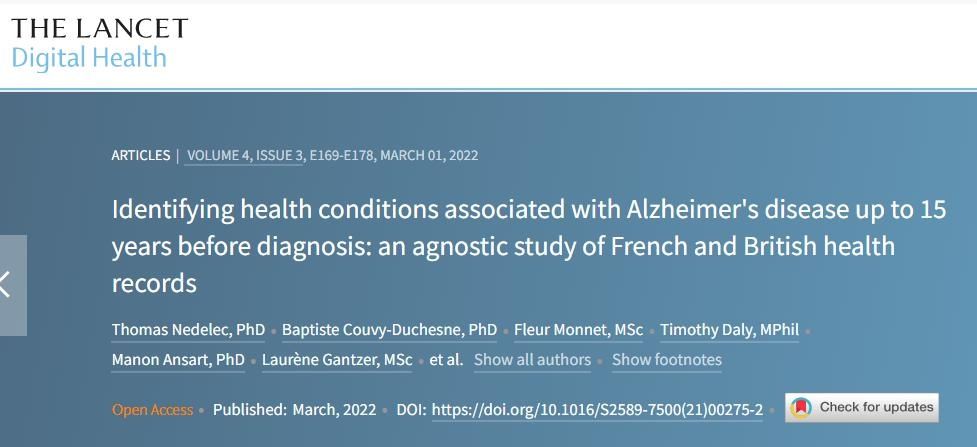
Scientists specifically explored 10 symptoms associated with Alzheimer’s disease in patients from two countries Symptoms include: depression and anxiety, severe stress and adjustment disorders, hearing loss, constipation, spondylosis, abnormal weight loss, fatigue (due to decreased emotional physiology), memory loss, syncope, and collapse.
Among them, depression and anxiety appeared 9 years before Alzheimer’s diagnosis, and constipation and abnormal weight loss appeared 7 years before diagnosis.
In the 2 years prior to diagnosis, symptoms such as sleep disturbance, hearing loss, hypothyroidism, hypotension, and cerebrovascular disease were strongly associated with Alzheimer’s disease.
Zhang Yuhu said that some of the symptoms related to Alzheimer’s disease mentioned in the study were concluded through big data analysis. From the research results:
During the 10-15 years of diagnosis, no symptoms significantly associated with Alzheimer’s disease were found;
In the 2-10 years before the diagnosis, anxiety, depression, Symptoms such as constipation, abnormal weight loss, memory loss, and hearing loss are closely related to the occurrence of Alzheimer’s disease, which is roughly in line with the recommendations of recognized Alzheimer’s disease prevention and treatment guidelines;
In Depression, anxiety, abnormal weight loss, especially memory loss, were significantly associated with Alzheimer’s disease within 2 years before diagnosis.
In addition, there are some relatively unfamiliar symptoms, such as urinary tract infection, dizziness, fractures, etc. Although studies have shown that they are related to Alzheimer’s disease, further scientific evidence is needed.
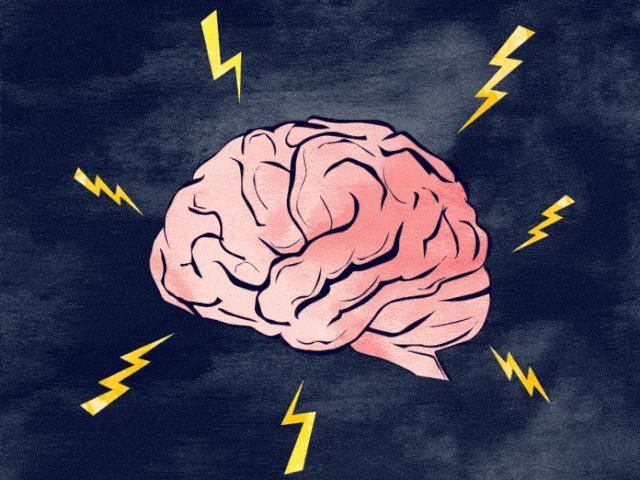
Wang Wei said that the above research is based on case analysis in the UK and France , cannot represent all races.
Different genes, the incidence rate and disease outcome (metastasis and development of the disease) cannot be generalized. The greatest value of this study is to remind us that Alzheimer’s disease will develop within 10 years before the diagnosis of Alzheimer’s disease. If there are early warning signs, early detection and early intervention can prevent the occurrence of dementia.
People with 8 manifestations are at risk
According to the above research, experts have combined the current disease characteristics and clinical experience to summarize and remind that the following early symptoms or pathogenic factors need to be caused special attention.
Memory loss
Memory loss is most closely associated with Alzheimer’s disease. The above study shows that people who have symptoms of memory loss within 2 years have a 3.4-6.6-fold increase in the incidence of Alzheimer’s disease in the future.
Mainly refers to the decline of subjective cognitive function, that is, one thinks that the memory is not as good as before, but it has not reached the level of dementia.
Depression, anxiety
The abnormal secretion of some neurotransmitters in the brain can lead to emotional problems in patients, which indirectly affects the transmission and reception of information in nerve cells in the brain, which in turn leads to cognition. Functional decline and dementia.
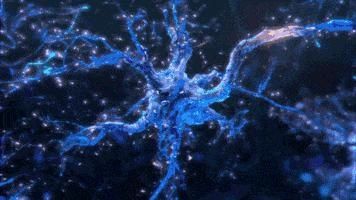
Before the onset of anxiety, depressive symptoms, associated with severe stress adaptation disorders, The decline of emotional physiological functions such as fatigue due to large emotional fluctuations is also an important signal.
Unusual weight loss
In people over 55 years of age, abnormal weight loss (more than 10% of body weight in one month on a normal diet) may be at risk for dementia factor.
The absorption of nutrients in the intestine is affected by neurotransmitters in the intestine. If food is difficult to be digested and absorbed normally, it will lead to weight loss.Dementia and intestinal flora disturbances may lead to dementia.
Constipation
The gut is the “second brain” of human beings. After the intestinal flora is imbalanced, it can induce abnormal neurotransmitters in the brain through the brain-gut axis, affecting neuroinflammation, β-amyloid deposition, which induces dementia.
In addition, patients with the following symptoms within 2 years before diagnosis are also clinically significant and need attention:
Hearing impairment
Hearing loss can increase dementia by 30% incidence rate. Hearing is an important way to socialize and receive information, and it is very important for the protection of cognitive function. Hearing loss leads to problems in information input, and the speed of brain aging will increase rapidly.
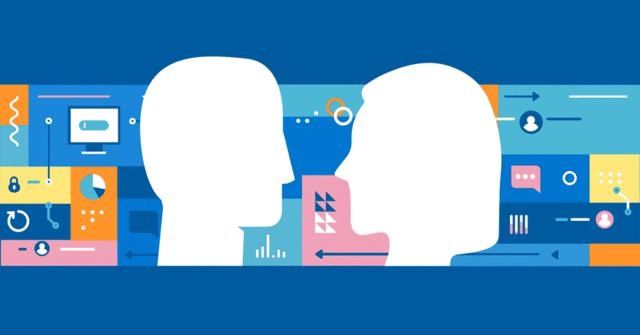
Sleep disorders
Including insomnia, abnormal sleep structure (such as Decreased deep sleep, frequent arousals) and sleep-disordered breathing, etc. Brain recovery mainly depends on deep sleep, and the reduction of deep sleep can lead to a decrease in the rate of amyloid removal from the brain, resulting in brain damage.
Hypotension
Hypotension may lead to decreased global cerebral perfusion and metabolic dysfunction of brain cells.
Hypothyroidism
Hypothyroidism can lead to cognitive decline and cause another form of dementia, Hashimoto’s encephalopathy, which should also be noted.
Intervention when memory declines
For Alzheimer’s disease, early detection and early treatment are particularly important. In particular, people with the above 8 manifestations should go to the hospital for treatment as soon as possible.
Wang Wei said that the most critical symptom is memory loss, which belongs to cognitive decline, which is the most intuitive early manifestation of Alzheimer’s disease.
Cognitive function has 6 major cognitive domains in clinical, including memory, calculation, language ability, time and space orientation ability (can’t remember date, season and passage of time), executive ability. Problems in any one area of cognition can lead to dementia.
The 10 Warning Symptoms of Dementia published by the International Alzheimer’s Association include:
Memory loss
Not good at familiar tasks
p>
Decreased language ability
Unsure of time and place
Declined thinking ability
Difficulty grasping the progress of work
Misplaced things
Changes in mood and behavior
Difficulty understanding visual and spatial information
withdrawing from work or social activities
What is the difference between idiots and forgetfulness?
Many people worry about their or their family’s “poor memory”. Generally speaking, the difference between the two is reflected in the following 6 aspects:
Recent memory impairment & instant memory impairment
The senile forgetfulness is manifested as a recent memory impairment, and it is partial, and can be recalled after being prompted, while Alzheimer’s disease is mainly a transient memory impairment, which is complete, and can also be recalled after being prompted. can not recall.
No Cognitive Impairment & Time, Location, Computing Impairment
Geriatric Amnesia is not associated with Cognitive Impairment, while Alzheimer’s Disease Often Barriers to time, place, numeracy.
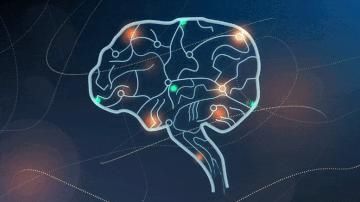
Keep normal mood & apathy
Forgetful old man Will maintain normal emotions such as joy, anger, sadness, etc., while Alzheimer’s patients often become apathetic and lack basic emotional performance.
Clear thinking & confused thinking
Forgetful elderly people have clear thinking, language expression and reasoning and analysis ability, while Alzheimer’s patients have confused thinking, poor language, and lack of sound Reasoning and analytical skills.
Worry about poor memory & unaware of memory loss
Forgetful elderly often appear to be very anxious about poor memory, while Alzheimer’s patients are unaware of their Memory in decline.
Have the ability to take care of themselves & gradually lose the ability to take care of themselves
The elderly who are forgetful can maintain normal self-care ability, while the elderly with Alzheimer’s disease will not be able to take care of themselves even if they have no physical disease. Gradually lose the ability to take care of themselves.
People with brain diseases, familial dementia and loneliness are more susceptible to the disease, and special attention should be paid to early prevention. Middle-aged people should pay attention to their lifestyles, maintain proper social interaction and a good emotional state, and avoid high blood pressure and diabetes. The elderly should pay attention to exercising to avoid brain injuries. They can do some stimulating mental activities such as reading, chess, and cards. . ▲
Source: Life Times
Editor: Gu Yue